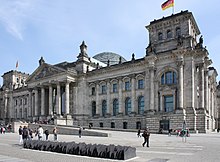Lambert Horn
Lambert Horn (born December 27, 1899 in Düsseldorf ; † June 2, 1939 in Sachsenhausen concentration camp ) was a German KPD politician .
Life
After attending primary school, Horn completed an apprenticeship as a railway fitter from 1913 to 1915. During the First World War , Horn was a member of the Imperial Navy , from which he was discharged in 1920.
Horn was active in the trade union movement at an early stage. First he was a member of the Christian union of German railway workers , later Horn became a member of the German Railway Workers ' Association (DEV) and EdED . At the end of 1920 he joined the Communist Party of Germany (KPD). In the 1920s he held numerous positions in the KPD. From the end of 1931 he was head of organization and from May 1932 political director in the KPD district leadership in Lower Rhine. In addition, from 1930 Horn took over several functions for the revolutionary trade union opposition at the regional level on the Lower Rhine.
From April 1932 to spring 1933 Horn was a member of the Prussian state parliament for his party . On February 7, 1933, Horn took part in the KPD leadership meeting in the Ziegenhals sports store . In the Reichstag elections of March 1933 , Horn was elected to the Reichstag as his party's candidate for constituency 22 (Düsseldorf-Ost). However, due to the Nazi persecution of communists, which had already started at that time, he was no longer able to take up his mandate. On March 30, 1933, Horn, like all other communist members of the Reichstag, was revoked by law.
From May 1933 Horn was political director of the illegal KPD district leadership Berlin-Brandenburg-Lausitz-Grenzmark. Together with Wilhelm Florin and Oskar Müller , he held a leading position in the domestic leadership of the illegal KPD and was actively involved in the anti-fascist resistance. On November 22, 1933, the Gestapo arrested Horn in Berlin. Rudolf Diels , the first chief of the Gestapo, stated in his memoir that Horn could be arrested after Albert Lange, the agit-prop leader of Berlin-Brandenburg who was arrested by the Königsberg police in autumn 1933, was tracked down had been. Horn was first imprisoned in the Gestapo prison on Prinz-Albrecht-Strasse and in the Columbia concentration camp before he was transferred to the Moabit remand prison on December 11, 1933 . Horn is said to have been mistreated several times during his detention.
On November 29, 1934, the People's Court sentenced Horn to three years in prison for “preparation for high treason and serious forgery ” . Following the prison sentence from December 19, 1934 to December 26-27. November 1936 in Remscheid-Lüttringhausen prison, Horn was taken into “ protective custody ” in the Düsseldorf police prison . On December 15, 1936, the Gestapo transferred him to the Sachsenhausen concentration camp . In 1938 he was isolated in the cell building as a member of the illegal camp leadership of the KPD. From May 1939 Horn was in the camp's infirmary with suspected leukemia . Horn was severely mistreated in Sachsenhausen concentration camp and died in this camp near Berlin .
Honor
- In the German Democratic Republic , a helicopter training squadron ( HAG-35 in Brandenburg / Havel) of the National People's Army was named after Horn.
- In 1960, a series of special postage stamps with portraits of murdered anti-fascists was issued in the GDR, including the 20-pfennig value with Horn's likeness.
- A plaque commemorates him in the memorial of the socialists .
- Since 1992 one of the 96 memorial plaques for members of the Reichstag murdered by the National Socialists has been commemorating Horn near the Reichstag in Berlin .
literature
- Horn, Lambert . In: Hermann Weber , Andreas Herbst : German Communists. Biographical Handbook 1918 to 1945 . 2nd, revised and greatly expanded edition. Karl Dietz, Berlin 2008, ISBN 978-3-320-02130-6 .
- Siegfried Mielke , Stefan Heinz : Railway trade unionists in the Nazi state. Persecution - Resistance - Emigration (1933–1945) (= trade unionists under National Socialism. Persecution - Resistance - Emigration. Volume 7). Metropol, Berlin 2017, ISBN 978-3-86331-353-1 , pp. 277, 293, 297-298, 511-512 (short biography).
Web links
- Short biography at the “Ernst-Thälmann-Gedenkstätte” association of friends. V. goat neck.
Individual evidence
- ^ Anti-fascists murdered in Sachsenhausen. Maximum postcards , issued by the Board of Trustees for the Development of National Memorials in Buchenwald, Sachsenhausen and Ravensbrück. Berlin 1960
- ↑ List of participants in the “Ernst-Thälmann-Gedenkstätte” e. V. (Accessed August 18, 2010)
- ↑ Martin Schumacher (Ed.): MdR The Reichstag members of the Weimar Republic in the time of National Socialism. Political persecution, emigration and expatriation 1933-1945 , Droste-Verlag, Düsseldorf 1991, ISBN 3-7700-5162-9 , p. 296f.
- ↑ Rudolf Diels: Lucifer ante Portas:… The first chief of the Gestapo speaks , 1950, p. 241.
| personal data | |
|---|---|
| SURNAME | Horn, Lambert |
| BRIEF DESCRIPTION | German politician (KPD), MdR |
| DATE OF BIRTH | December 27, 1899 |
| PLACE OF BIRTH | Dusseldorf |
| DATE OF DEATH | June 2, 1939 |
| Place of death | Sachsenhausen concentration camp |


